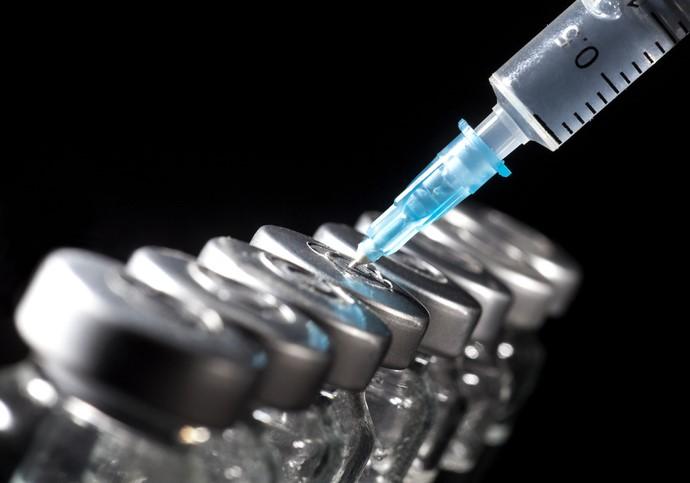Claiming not to be in competition with each other but rather with time and the coronavirus, top executives from the world's leading pharmaceutical companies said yesterday they're working as fast as they can to develop, scale up, and distribute a COVID-19 vaccine.
At a media briefing organized by the International Federation of Pharmaceutical Manufacturers & Associations (IFPMA), executives from AstraZeneca, GlaxoSmithKline, Johnson & Johnson, and Pfizer also said they were committed to making coronavirus vaccines safe and ensuring equitable access.
"We are deeply aware that no one can fight COVID-19/SARS-CoV-2 on their own," said IFPMA Director General Thomas Cueni, MS. "The industry is all in."
"As we all know, we need a lot of options, as soon as possible," said Albert Bourla, DVM, PhD, chairman and CEO of Pfizer, which has an mRNA vaccine candidate with German company BioNTech currently in phase 1 trials in Europe and the United States.
Pfizer, Johnson & Johnson, and AstraZeneca are among a handful of companies currently working on a vaccine for the coronavirus, which has sickened more than 5.9 million people worldwide and killed more than 358,000. According to the World Health Organization (WHO), there are more than 10 candidates in clinical evaluation and 115 in preclinical evaluation. Public health officials agree that the COVID-19 pandemic won't end until a vaccine, or several, are available.
Pascal Soriot, DVM, MBA, executive director and CEO of AstraZeneca, said his company is working on several vaccine candidates. Among them is a vaccine, developed with Oxford University, that uses a human viral vector based on a weakened version of the common cold.
"We don't know which vaccine is going to work, and the good thing is we're testing different technologies," Soriot said. "We have to give it several shots because we don't know which one is going to work."
GlaxoSmithKline is working on vaccine adjuvant technology that would help scale up production of several vaccine candidates.
"It's a proven technology in pandemic situations," said Emma Walmsley, MA, CEO of GlaxoSmithKline. "It's proven also to be safe as well as effective. And critically it can boost the immune response and is therefore antigen sparing, so that you can produce more vaccine sparingly, and that's obviously key in this situation."
Walmsley said GSK would supply as many as a billion doses of the adjuvant in 2021.
Scaling up for equitable access
But all the executives noted that beyond developing a vaccine that is safe and effective, the big challenge will be producing enough vaccines for the world and getting them distributed quickly. Cueni noted that as many as 15 billion doses of a COVID-19 vaccine could be needed, and in order to prepare for that, companies need to start investing in scaling up manufacturing efforts now, even if they don't know whether their candidate will work.
"We also need to agree which vaccine candidates deserve to get priority to be moved to the next phase," Cueni said. "The vaccines need to be safe, effective, and they need to be scalable."
Paul Stoffels, MD, chief scientific officer for Johnson & Johnson, said the company is currently building plants in Europe, the United States, and Asia in preparation for manufacturing a vaccine and bottling it, even though it doesn't expect to have efficacy data on its vaccine candidate until early next year.
"It's very important that, in parallel, you start looking into from the beginning how can you upscale," Stoffels said. "Preparation for a billion vaccines next year has to have multiple parts."
But Soriot said the issue is not so much producing enough vaccine doses as having enough of the specialized glass vials to put them in. Vaccine experts and health officials have warned that there is currently a shortage of the vials.
"There's not enough not vials in the world, so like everybody else, we're looking at 5 doses per vial or 10 doses per vial so we can actually produce more doses with a limited number of glass vials," he said.
The executives also said they were committed to participating in the Access to COVID-19 Tools Accelerator, a global mechanism for speeding up the development, deployment, and equitable distribution of vaccines and therapeutics that the WHO announced in April.
"The goal is to provide it to everyone around the world in a fair and equitable manner," said Soriot.
"I'm thinking very carefully what will be the best way to make sure that everybody will get a fair share of the supplies as quickly as possible," Bourla said.
But the companies expressed less interest in another WHO initiative, officially launched today, that is asking industry, governments, and non-profit organizations to voluntarily contribute patent rights, clinical trial results, and other information that could be shared globally to develop vaccines, therapies, and diagnostics. The WHO says the initiative, called the COVID-19 Technology Access Pool, offers concrete actions to endure equitable access.
"I don't quite see what the new initiative adds," said Cueni.
Walmsley said the issue of fair and equitable access illustrates why it's important to have more than one COVID-19 vaccine. "What we all have to do is support multiple candidates to get to scale as fast as possible, because the best possible way to guarantee access is to have the volume available for all," she said.



















